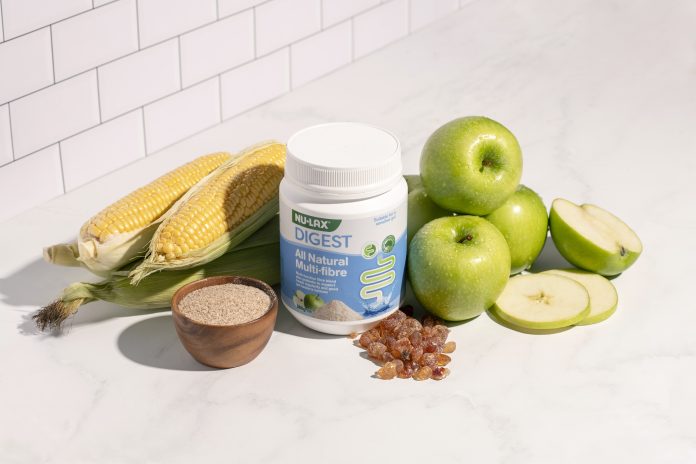As seen in the December issue of Retail Pharmacy magazine.
The health benefits of dietary fibre vary according to the type and dose, a recent study has found. Retail Pharmacy spoke with Dione Promm, Head of Science at Nu-Lax, to learn more.
How does the unique formulation of Nu-Lax Natural Multi-Fibre provide a variety of different fibre types? What types of fibre are found in this product?
Nu-Lax Natural Multi-fibre contains all four essential dietary fibre types, coming from whole foods. Each of these fibre types has differing health benefits:
- Soluble fibre helps to slow the emptying process in our stomach, keeping us feeling full, supporting satiety and assisting with healthy weight management.
- Insoluble fibre provides bulk to the stool and acts as a sponge to bind to toxins and waste products.
- Prebiotic fibre feeds the friendly bacteria in the gut, creating an optimum environment for beneficial intestinal flora. Most prebiotic fibres are soluble, but some may also be insoluble.
- Viscous gel-forming fibre promotes fullness and helps bowel lubrication.
Ideally, we should consume all four types of fibre to maintain a thriving digestive system, and in turn, optimise our overall health. Nu-Lax makes this easy in one step.
Our multi-fibre blend contains a variety of fibre sources: apple fibre, soluble corn fibre, acacia gum and psyllium husk. Together, this combination will synergistically work to support regularity, healthy bowel function and a healthy gut microbiome.
How can Nu-Lax Natural Multi-fibre help those suffering from IBS and gut health issues such as lack of regularity, etc.?
Nu-Lax Natural Multi-fibre is certified low FODMAP and made with gentle ingredients that are well tolerated by sensitive individuals.
Having the low FODMAP certification appeals, particularly, to those with diagnosed digestive issues such as IBS or SIBO [small intestinal bacterial overgrowth] or those who follow a low FODMAP diet.
It’s also gluten-free and dairy free as well as being vegan-friendly.
According to a recent Australian study, only 28 per cent of [surveyed] adults consume enough dietary fibre.1 The Australian government’s recommended daily intake is 25-30g.2
Increasing fibre intake has been associated with reduced risk of developing some chronic diseases and linked to improving digestive health.1
For those living with IBS and other gut conditions, fibre supports the gut’s beneficial microflora and ensures enough bulky material is regularly passing through the digestive tract.
We, of course, recommend that anyone with a persistent medical condition should consult their healthcare professional to ensure this product is right for them.
How does Nu-Lax Natural Multi-fibre compare with similar products on the market? What is the main point of difference?
There are a number of fibre products on the market. Most of the other products generally only contain one type of dietary fibre from one source, so they may not impart all the synergistic benefits achieved from a multi-fibre blend.
Nu-Lax Natural Multi-fibre is unique because it contains all functional dietary fibre types, plus it’s a good source of dietary fibre nutrition at 4.1g per serve, allowing people to get the most out of a quality fibre supplement.
Many products on the market are also flavoured, sweetened and coloured with artificial ingredients that can affect some sensitive individuals. Our product only contains natural ingredients and has no artificial flavours, colours, sweeteners or GMOs. It also tastes great and dissolves easily.
What is the recommended dose of Nu-Lax Natural Multi-fibre? What is the best way to take the product?
For adults, the recommended dose is one heaped teaspoon (equivalent to 6g) daily. We recommend stirring into at least 200ml of water (or more, as per your taste preference).
What precautions or contraindications should be considered before taking Nu-Lax Natural Multi-fibre?
High fibre intake is contraindicated in:
- The acute phase of diverticulitis and other situations where the bowel is inflamed.
- Disorders of the oesophagus and inflammatory bowel diseases, including Crohn’s and ulcerative colitis that can result in obstruction.
It’s also recommended to take medications and other dietary supplements at a separate time of the day to your fibre, to avoid any impact on absorption.
As with any new product, we recommend customers check the ingredients and discuss any concerns with their healthcare professional.
How can pharmacy staff promote the product in their stores?
- It can be companion sold with any laxative-based product to support an individual in ensuring they’re having enough fibre to prevent constipation.
- Multi-fibre can also be companion-sold to anyone buying probiotics. It will act as a food source to feed the probiotics in addition to ensuring the intestinal environment is healthy and favourable for the probiotics to survive.
- For anyone who is concerned that they’re not eating the best they can, particularly not having a balanced healthy diet containing enough fresh fruit and vegetables, this is a great supplement option to help them achieve their daily fibre requirements.
For more information:
- Email customer service at: info@orchard-mfg.com.au
- Visit: nu-lax.com/product/nu-lax-all-natural-multi-fibre/
References
- Fayet-Moore F, et al. ‘Dietary fibre intake in Australia. Paper 1: Associations with demographic, socio-economic and anthropometric factors’. Nutrients, 2018; 10 (5).
- Australian government. ‘Nutrient reference values for Australia and New Zealand’, 2019. eatforhealth.gov.au/nutrient-reference-values/nutrients/dietary-fibre








